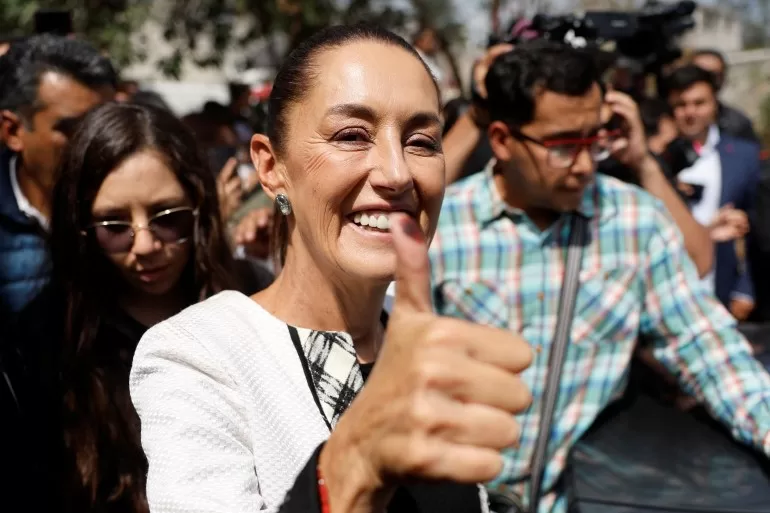The vote has been heralded as a major step in Mexico, with the winner becoming the first woman leader in a country often criticised for its macho culture.
Polls have consistently placed Sheinbaum about 20 percentage points ahead of her closest challenger Xochitl Galvez of an opposition coalition comprised of the Institutional Revolutionary Party (PRI), which ruled Mexico for seven decades until democratic elections in 2000, the right-wing PAN, and the leftist PRD party.
There were already long lines outside voting centres when the polls opened at 8am local time (starting at 13:00 GMT). Polls will close at 6pm (starting at 23:00 GMT on Monday), and the first official preliminary results are expected soon afterwards.
Sheinbaum, speaking to journalists from the passenger side of a car, said it was a historic day and she felt at ease on her way to vote.
“Everyone must get out to vote,” Sheinbaum, a physicist and former Mexico City mayor, said during a live broadcast on local TV.
Dozens of candidates killed
Sunday’s elections are the biggest in Mexico’s history, with voters electing about 20,000 posts.
The contest has, however, been marred by violence, with 38 candidates killed during the campaign – the most in the country’s modern history, stoking concerns about the threat of warring drug cartels to Mexico’s democracy.
Lisa Sanchez, executive director of Mexico United Against Crime, said this electoral process has been the most violent.
“Eighty-seven percent of all the candidates that were aggressed or killed were actually running for a post at the municipal local level. This is something that is very worrisome and talks about the need for attending or tackling the level of criminal governance that we have in Mexico at the very local level,” she told Al Jazeera.
“The main problem of the electoral violence that we’re seeing doesn’t come only from criminal actors … there are political actors involved in these violence dynamics as well as authorities at the very local level,” she noted, adding that violence has been one of the many tools that these actors have in hand to prevent changing the political dynamics.
A victory by either Sheinbaum or Galvez will be heralded as a major step in Mexico, with either candidate becoming the first female leader in a country often criticised for its macho culture.
The winner will face formidable challenges – especially how to tame organised crime violence, which contributed to more than 185,000 people being killed since President Andres Manuel Lopez Obrador took office in December 2018.
Acts of violence, along with electricity and water shortages, are problems as Mexico attempts to persuade manufacturers to relocate as part of the nearshoring trend, in which companies move supply chains closer to their main markets.
Both candidates have promised to expand welfare programmes, which could be a challenge amid a large deficit this year and sluggish GDP growth of just 1.5 percent expected by the central bank next year.
“Our president really cares about poor people,” Alejandro Benitez, 68, who plans to vote for Sheinbaum despite living in Tepatepec, a town in the Hidalgo state where her opponent Galvez grew up, told Reuters.
The new president, who is set to begin a six-year term on October 1, will also face a series of tense negotiations with the United States over the huge flows of US-bound migrants crossing Mexico and security cooperation over drug trafficking.
Mexican officials, however, expect these negotiations to be more difficult if the US presidency is won by Donald Trump in November elections.

